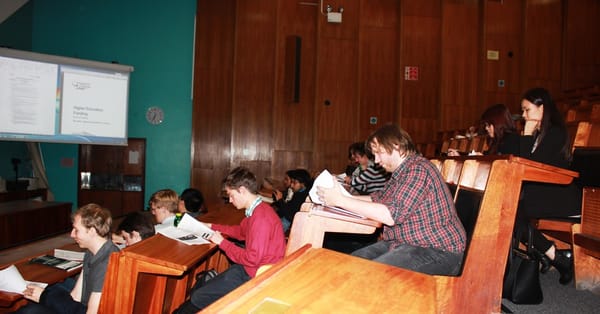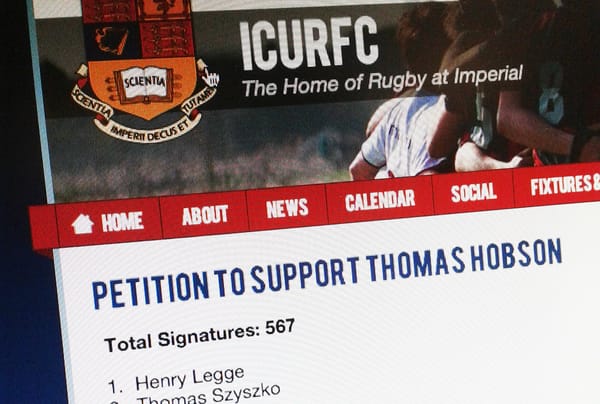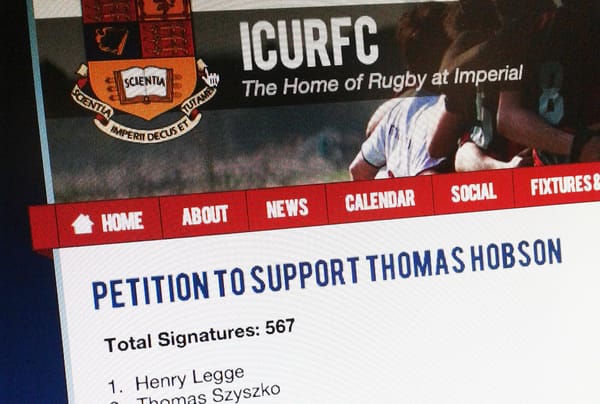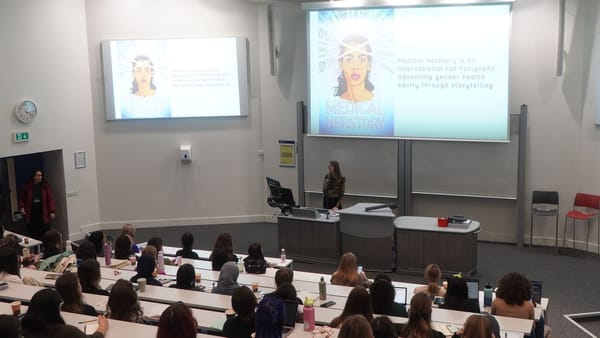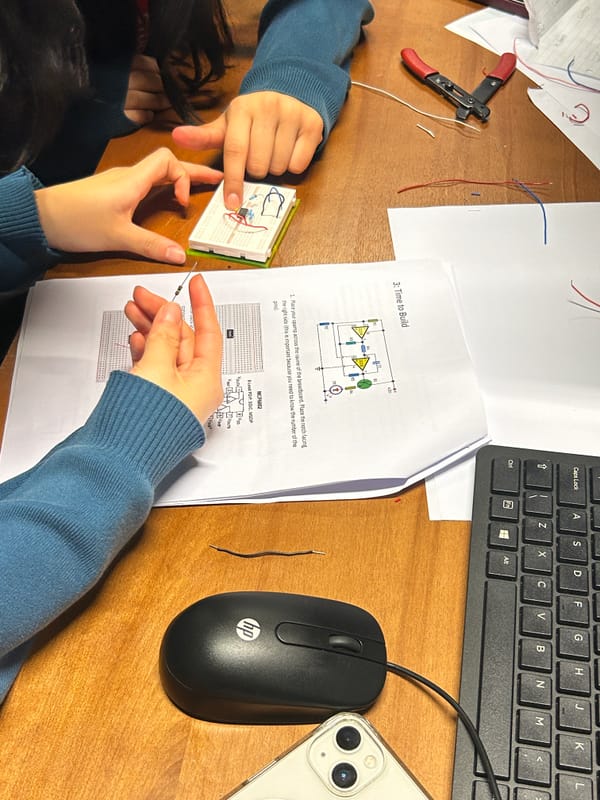Publish and Perish: Professor sends posthumous email on "How professors are treated at Imperial."
Stefan Grimm emailed colleagues after his death, months after being sent "ultimatum email" to either find more funding or leave Imperial

An Imperial professor who died “suddenly and unexpectedly” in September has allegedly sent a posthumous email to his colleagues, with the subject line: “How Professors are treated at Imperial College.”
Professor Stefan Grimm, aged 51, from the Department of Toxicology within the Faculty of Medicine, died in late September. An email from an account named professorstefangrimm@gmail.com, was then sent on October 21st.
An Imperial spokesperson said that there was no reason to believe the email was not genuine, and we have republished the email in full at the end of this article.
The email was sent to around 40 internal Imperial email addresses, including senior members of the Faculty of Medicine. It details how Grimm was told he would have to leave College after not securing enough research funding.
Grimm had previously published over 70 papers covering cell signalling and anti-cancer genes in high-impact journals during his career, alongside two books and several review articles.
Grimm describes in his email that this was a case of “publish and perish.” The email was sent three weeks after colleagues were informed of his death on the 29th of September from Martin Wilkins, Head of Department of Medicine and Grimm’s boss.
Grimm describes how Wilkins told him that although he had submitted the highest number of grant applications, and despite already acquiring £135,000, he had to obtain a total of £200,000 all in one go in the form of a programme grant to remain working at Imperial.
The email outlines how Wilkins told Grimm in May 2013 that he would have to leave Imperial within the year if he didn’t acquire enough funding. Wilkins then sent him an “ultimatum email” in March of this year, constituting “the start of informal action” against Grimm. This email has since been published in a follow-up article on the Times Higher Education website, and we have republished it below
Wilkins stated in the email that he expected Grimm to succeed in securing a programme grant as lead Principal Investigator (PI), and would have to achieve this within 12 months “in order for [Grimm’s] performance to be considered at an acceptable standard.”
Grimm goes on to state in his email how “this is not a university anymore but a business… with very few profiteering and the rest of us being milked for money.
In the email sent to Grimm from Wilkins, Wilkins does state that he is “committed to doing what I can to help you succeed and will meet with you monthly to discuss your progression and success in achieving the objective outlined.”
He goes on to say to Grimm that “You have previously initiated discussions in our meetings regarding opportunities outside of Imperial College and I know you have been exploring opportunities elsewhere.”
“Should this be the direction you wish to pursue, then I will do what I can to help you succeed.”
Following the email being sent from professorstefangrimm@gmail.com, Nigel Buck, Operating Officer for the Faculty of Medicine, sent two similar emails to those internal and external to the College who received the email.
Buck’s emails do not address the legitimacy of the email from Grimm, nor its contents, but does say that the death is under investigation by statutory authorities, and that Stefan’s death came as a “great shock.”
Felix has been unable to confirm his cause of death, but has been told that the West London Coroner’s District adjourned an inquest into his death on October 8th. It is unknown when they will reopen the inquest and when the exact cause of death will be made public.
Felix was told last week, prior to the publication of Grimm’s email, that College is currently reviewing the relevant “policies and procedures” and present the findings in a report by a group of senior College staff. The Director of Human Resources accompanied by the Senior Consul, Professor Richard Thompson, is leading the review.
A college spokesperson also that “Contrary to assertions elsewhere, Professor Grimm was not under formal review nor had he been given any notice of dismissal. It is standard practice in higher education institutions to conduct both informal and formal performance management.”
“In this tragic case, the process was at the informal stage.”
“His line manager met with him on a number of occasions to see how the College could help him to develop more competitive grant applications, for example through internal peer-review, collaborations and letters of support. This is in line with requests from funders of research to ensure applications are of sufficient quality to be considered.”
Professor James Stirling, Provost of Imperial College London, said: “Imperial seeks to give every member of its community the opportunity to excel and to create a supportive environment in which their careers may flourish. Where we become aware that the College is falling short of this standard of support to its members, we will act.”
Grimm’s email initially surfaced on a blog written by David Colquhoun, a University College London emeritus professor of pharmacology, who hosts dcscience.net. He was forwarded the email from associates at Imperial. He states on his blog: “No doubt any Imperial staff member would be in great danger if they were to publish the email.”
Said Colquhoun about his blog post, “This bullying has been going on for years, and it is more prevalent than it used to be. The message to Grimm was not to do more research, but that you mustn’t do cheap research.”
“I think there should be a petition set up for a public inquiry into his death, and ask what the authorities are going to do about it.”
“It just seems Imperial are doing their best to whitewash it. They rarely get to the heart of the matter.”
Imperial College's public statement can be found here.
Stefan Grimm’s email, taken from dcscience.net:
From: Stefan Grimm <professorstefangrimm@gmail.com>
Date: 21 October 2014 23:41:03 BST
To:
Subject: How Professors are treated at Imperial College
Dear all,
If anyone is interested how Professors are treated at Imperial College: Here is my story.
On May 30th ’13 my boss, Prof Martin Wilkins, came into my office together with his PA and ask me what grants I had. After I enumerated them I was told that this was not enough and that I had to leave the College within one year – “max” as he said. He made it clear that he was acting on behalf of Prof Gavin Screaton, the then head of the Department of Medicine, and told me that I would have a meeting with him soon to be sacked. Without any further comment he left my office. It was only then that I realized that he did not even have the courtesy to close the door of my office when he delivered this message. When I turned around the corner I saw a student who seems to have overheard the conversation looking at me in utter horror.
Prof Wilkins had nothing better to do than immediately inform my colleagues in the Section that he had just sacked me.
Why does a Professor have to be treated like that?
All my grant writing stopped afterwards, as I was waiting for the meeting to get sacked by Prof Screaton. This meeting, however, never took place.
In March ’14 I then received the ultimatum email below. 200,000 pounds research income every year is required. Very interesting. I was never informed about this before and cannot remember that this is part of my contract with the College. Especially interesting is the fact that the required 200,000.- pounds could potentially also be covered by smaller grants but in my case a programme grant was expected.
Our 135,000.- pounds from the University of Dammam? Doesn’t count. I have to say that it was a lovely situation to submit grant applications for your own survival with such a deadline. We all know what a lottery grant applications are.
There was talk that the Department had accepted to be in dept for some time and would compensate this through more teaching. So I thought that I would survive. But the email below indicates otherwise. I got this after the student for whom I “have plans” received the official admission to the College as a PhD student. He waited so long to work in our group and I will never be able to tell him that this should now not happen. What these guys don’t know is that they destroy lives. Well, they certainly destroyed mine.
The reality is that these career scientists up in the hierarchy of this organization only look at figures to judge their colleagues, be it impact factors or grant income. After all, how can you convince your Department head that you are working on something exciting if he not even attends the regular Departmental seminars? The aim is only to keep up the finances of their Departments for their own career advancement.
These formidable leaders are playing an interesting game: They hire scientists from other countries to submit the work that they did abroad under completely different conditions for the Research Assessment that is supposed to gauge the performance of British universities. Afterwards they leave them alone to either perform with grants or being kicked out. Even if your work is submitted to this Research Assessment and brings in money for the university, you are targeted if your grant income is deemed insufficient. Those submitted to the research assessment hence support those colleagues who are unproductive but have grants. Grant income is all that counts here, not scientific output.
We had four papers with original data this year so far, in Cell Death and Differentiation, Oncogene, Journal of Cell Science and, as I informed Prof Wilkins this week, one accepted with the EMBO Journal. I was also the editor of a book and wrote two reviews. Doesn’t count.
This leads to a interesting spin to the old saying “publish or perish”. Here it is “publish and perish”.
Did I regret coming to this place? I enormously enjoyed interacting with my science colleagues here, but like many of them, I fell into the trap of confusing the reputation of science here with the present reality. This is not a university anymore but a business with very few up in the hierarchy, like our formidable duo, profiteering and the rest of us are milked for money, be it professors for their grant income or students who pay 100.- pounds just to extend their write-up status.
If anyone believes that I feel what my excellent coworkers and I have accomplished here over the years is inferior to other work, is wrong. With our apoptosis genes and the concept of Anticancer Genes we have developed something that is probably much more exciting than most other projects, including those that are heavily supported by grants.
Was I perhaps too lazy? My boss smugly told me that I was actually the one professor on the whole campus who had submitted the highest number of grant applications. Well, they were probably simply not good enough.
I am by far not the only one who is targeted by those formidable guys. These colleagues only keep quiet out of shame about their situation. Which is wrong. As we all know hitting the sweet spot in bioscience is simply a matter of luck, both for grant applications and publications.
Why does a Professor have to be treated like that?
One of my colleagues here at the College whom I told my story looked at me, there was a silence, and then said: “Yes, they treat us like sh*t”.
Best regards,
Stefan Grimm
Wilkin’s email to Stefan Grimm, taken from The Times Higher Education artlcle that can be found here:
Date: 10 March 2014
Dear Stefan
_I am writing following our recent meetings in which we discussed your current grant support and the prospects for the immediate future. The last was our discussion around your PRDP, which I have attached. _
As we discussed, any significant external funding you had has now ended. I know that you have been seeking further funding support with Charities such as CRUK and the EU commission but my concern is that despite submitting many grants, you have been unsuccessful in persuading peer-review panels that you have a competitive application. Your dedication to seek funding is not in doubt but as time goes by, this can risk becoming a difficult situation from which to extricate oneself. In other words, grant committees can become fatigued from seeing a series of unsuccessful applications from the same applicant.
I am of the opinion that you are struggling to fulfil the metrics of a Professorial post at Imperial College which include maintaining established funding in a programme of research with an attributable share of research spend of £200k p.a and must now start to give serious consideration as to whether you are performing at the expected level of a Professor at Imperial College.
Over the course of the next 12 months I expect you to apply and be awarded a programme grant as lead PI. This is the objective that you will need to achieve in order for your performance to be considered at an acceptable standard. I am committed to doing what I can to help you succeed and will meet with you monthly to discuss your progression and success in achieving the objective outlined. You have previously initiated discussions in our meetings regarding opportunities outside of Imperial College and I know you have been exploring opportunities elsewhere. Should this be the direction you wish to pursue, then I will do what I can to help you succeed.
Please be aware that this constitutes the start of informal action in relation to your performance, however should you fail to meet the objective outlined, I will need to consider your performance in accordance with the formal College procedure for managing issues of poor performance (Ordinance D8) which can be found at the following link.http://www3.imperial.ac.uk/secretariat/collegegovernance/provisions/ordinances/d8
Should you have any questions on the above, please do get in touch.
Best wishes
Martin


